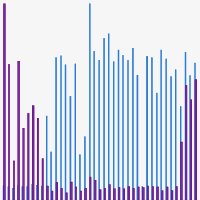Guide-it Knockin Screening Kit

A common bottleneck for genome editing applications involves a lack of efficient methods for detecting successfully engineered SNPs or insertions. While many researchers rely on sequencing to verify editing, this typically requires isolation and expansion of single-cell clones and yields data that can be challenging to analyze. The Guide-it Knockin Screening Kit provides a streamlined method for identifying precise edits at any locus, either in heterogeneous or clonal cell populations. The assay takes only 4 hours to complete and can be performed using basic laboratory equipment.
A common bottleneck for genome editing applications involves a lack of efficient methods for detecting successfully engineered SNPs or insertions. While many researchers rely on sequencing to verify editing, this typically requires isolation and expansion of single-cell clones and yields data that can be challenging to analyze. The Guide-it Knockin Screening Kit provides a streamlined method for identifying precise edits at any locus, either in heterogeneous or clonal cell populations. The assay takes only 4 hours to complete and can be performed using basic laboratory equipment.
One of the most powerful applications of genome editing technologies such as the CRISPR/Cas system is the ability to introduce precise changes at genomic loci of interest. However, the likelihood of success for this type of application is generally low because it often relies on an endogenous repair mechanism known as homology-directed repair (HDR) that occurs at relatively low frequency. Consequently, there are two different stages when the detection of successful HDR events is critically important. The first stage involves optimization of experimental conditions to achieve the highest percentage of error-free HDR events in an edited population before moving forward with the isolation of single-cell clones. The second stage involves identification of cell lines carrying the edit of interest after single-cell isolation and expansion in 96-well plates. The Guide-it Knockin Screening Kit addresses the need for sensitive detection of successful HDR at both stages by providing a simple fluorescence-based method that can be applied to screen edited populations as well as clones from 96-well plates for edits ranging in size from single-nucleotide substitutions to longer insertions.
The kit assay consists of PCR amplification of the genomic target site, followed by an enzymatic assay employing assay-specific oligos that can be designed with our online tool. The dual-color fluorescence-based readout from the assay can be measured using a standard plate reader or qPCR machine. A positive fluorescent signal from the assay is highly correlated with the correct introduction of the desired edit. For engineering SNPs, the assay enables detection of single-nucleotide substitutions with high sensitivity in both mixed and clonal populations and can be used to positively identify heterozygous clones carrying one copy each of the edited (SNP) and unedited (WT) alleles. For scenarios involving knockin of longer sequences, the assay allows for the simultaneous detection of seamless insertions at both 5' and 3' ends of the incorporated sequence.
Overview
- Accurate detection of precise nucleotide substitutions or insertions following genome editing
- Can be used to assay any edit at any genomic locus
- Suitable for analysis of heterogeneous (bulk-edited) or clonal cell populations
- Dual-color chemistry enables simultaneous detection of two different alleles (e.g., SNP and WT) in heterozygous clones
- Simple and rapid workflow takes just 4 hours to complete and requires only basic laboratory equipment
- Online tool available for streamlined design of assay-specific oligos
More Information
Applications
- Rapid detection of single-nucleotide substitutions or precise insertions in edited cell populations
- Simultaneous detection of edited and unedited alleles in heterozygous clones
- Analysis of editing efficiency in heterogeneous populations prior to single-cell cloning
Additional product information
Please see the product's Certificate of Analysis for information about storage conditions, product components, and technical specifications. Please see the Kit Components List to determine kit components. Certificates of Analysis and Kit Components Lists are located under the Documents tab.
Beta-tester testimonials on the Guide-it Knockin Screening Kit
"The kit was very good at identifying WT/SNV hets, which is often what I'm looking to uncover."
—Dr. Justin McDonough, THE JACKSON LABORATORY
"The assay was easy and fairly quick to perform...Sanger sequencing was complicated to analyze since one allele was edited and the other allele had an indel resulting in mixed electropherograms...I like the fact that the fluorescent probes are built into the kit and the user only needs to supply fairly standard probes which are not very expensive."
—Dr. Karin Nitiss, UNIVERSITY OF ILLINOIS AT CHICAGO
Takara Bio USA, Inc.
United States/Canada: +1.800.662.2566 • Asia Pacific: +1.650.919.7300 • Europe: +33.(0)1.3904.6880 • Japan: +81.(0)77.565.6999
FOR RESEARCH USE ONLY. NOT FOR USE IN DIAGNOSTIC PROCEDURES. © 2025 Takara Bio Inc. All Rights Reserved. All trademarks are the property of Takara Bio Inc. or its affiliate(s) in the U.S. and/or other countries or their respective owners. Certain trademarks may not be registered in all jurisdictions. Additional product, intellectual property, and restricted use information is available at takarabio.com.



